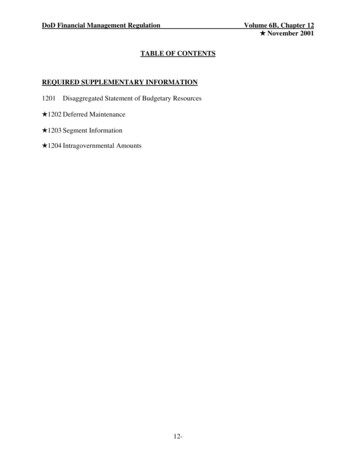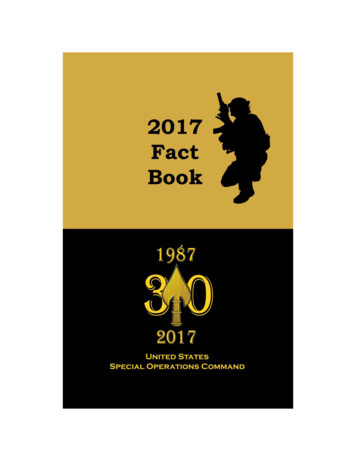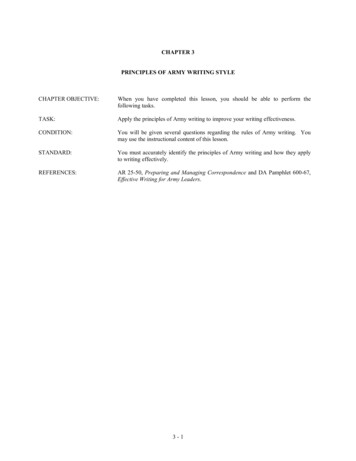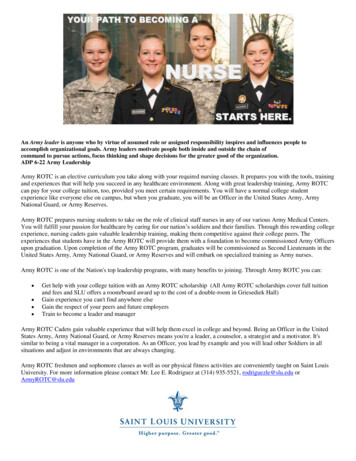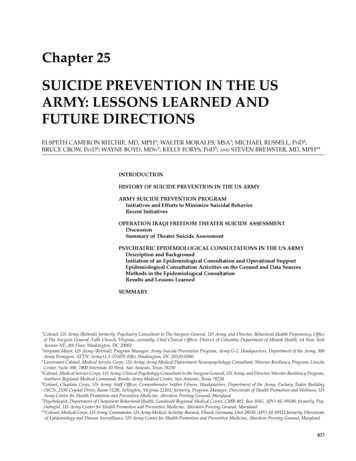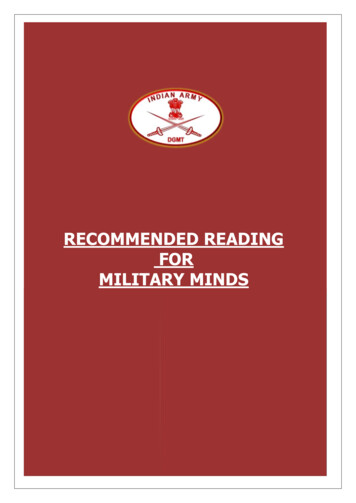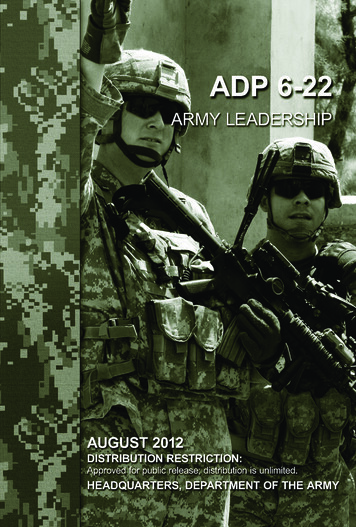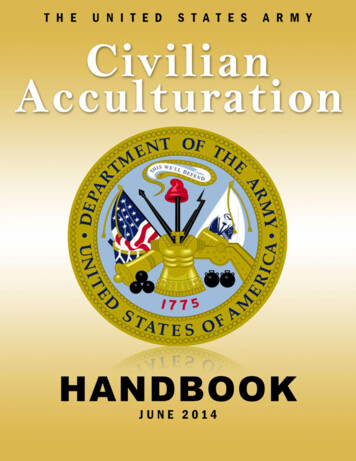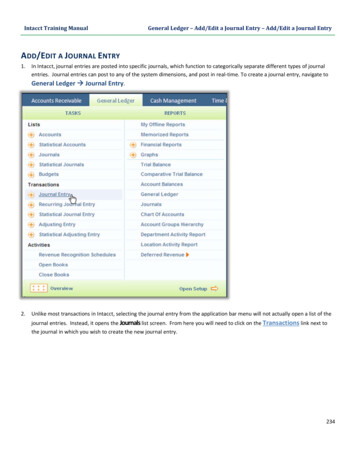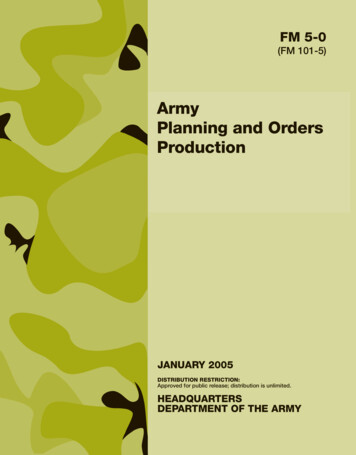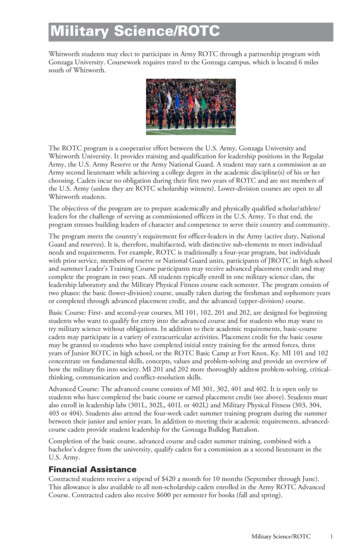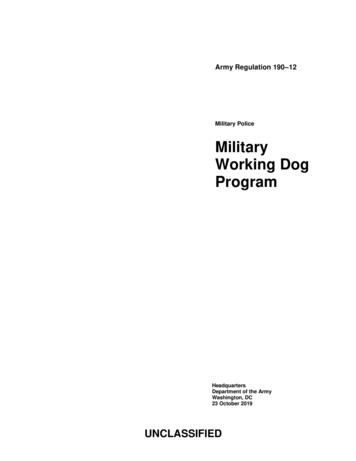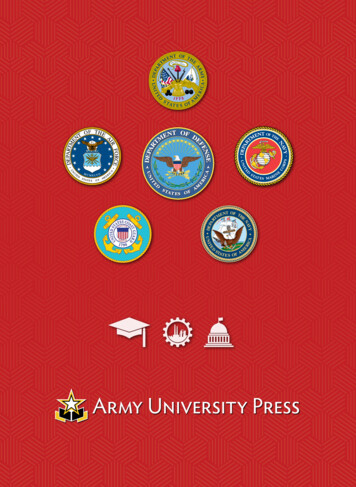
Transcription
Army University Press
journal ofmilitarylearningApril 2020Metacognition and the Military Student p3Khachadoorian, Steen, and MackenzieMilitary Health System p19Reed, Laib, Strauss-Riggs, and KirschLearning Challenges Faced byTransitioning Service Members p36Stull, Kirchner, and Herd
journal ofmilitarylearningApril 2020, Vol. 4, No. 1Commander, U.S. Army Combined Arms Center;Commandant, Command and General Staff CollegeLt. Gen. James E. RaineyDeputy Commanding General–EducationProvost, The Army University; Deputy Commandant,Command and General Staff CollegeMaj. Gen. Steve MaranianEditor; Academic Affairs Division Chief,The Army UniversityCol. Paul E. Berg, PhDEditorial Board MembersDirector, Directorate of Academic Affairs,The Army UniversityCol. Kenneth HawleyDean of Academics, Command andGeneral Staff CollegeDr. James B. MartinDeputy Director, Academic Affairs,The Army UniversityDr. Keith R. BeurskensAssociate Professor, College of Education,Kansas State UniversityDr. Susan M. Yelich BinieckiCommand Sergeant Major,The Army UniversityCommand Sgt. Maj. Teresa M. DuncanFaculty, Intermediate Course,Army Management Staff CollegeDr. David M. QuisenberryDeputy Director, Directorate of Training andDoctrine, Maneuver Center of ExcellenceDr. Jay A. BrimstinDirector, The Army DistributedLearning ProgramHelen RemilyAssociate EditorsDr. David T. Culken—Faculty and Staff Development Division, The Army UniversityPamela Hicks—Training Director, 381st Training Group (U.S. Air Force)Dr. John Persyn—Chief, Accreditations and Programs, The Army UniversityDr. Louis Smith—Dean and Chief Academic Officer, U.S. Army Recruiting and Retention CommandProductionDirector and Editor in Chief, Army University Press: Col. Katherine P. Guttormsen, U.S. ArmyEditorial Assistant: Linda DarnellManaging Editor: Col. William M. Darley, U.S. Army, RetiredOperations Officer: Maj. David B. Rousseau, U.S. ArmySenior Editor: Lt. Col. Jeffrey Buczkowski, U.S. Army, RetiredWriting and Editing: Beth Warrington; Dr. Allyson McNitt; Crystal Bradshaw-Gonzalez, ContractorDesign Director: Michael SerravoLayout and Design: Arin BurgessArmy University Press
April 2020Table of ContentsPEER REVIEWED ARTICLES3Metacognition and the Military Student: Pedagogical Considerationsfor Teaching Senior Officers in Professional Military EducationAngelle A. Khachadoorian, Susan L. Steen, and Lauren B. Mackenzie19Humanitarian Assistance and Disaster Relief Competenciesand Training Pertinent to the Military Health System36Capt. Paul Reed, Maj. Jaimie Laib, Kandra Strauss-Riggs, and Thomas D. KirschLearning Challenges Faced by Transitioning Military Service Members:Voices of Military Transition CounselorsFaith Stull, Michael Kirchner, and Ann HerdARTICLES OF INTEREST57An Evidence-Based Approach to Unit-Level Teaching and Learning68Instructional Strategies for the Future81The Importance of Teaching Followership in Professional Military EducationCol. Thomas Williams, RetiredBrenda Bannan, Nada Dabbagh, and J. J. WalcuttCol. Paul BergANNOUNCEMENTS88Career Courses’ Cognitive Assessment Battery Administeredat the Captains Career CourseFrom the Editor90Upcoming Conferences of Note
JMLLetter from the EditorWelcome to the seventh issueand our fourth year of publication of the Journal of MilitaryLearning (JML), the Army University’s professional educational journal. As the editorof the JML, I am honored by the incredibleprofessionalism and dedication that our authors, editors, and reviewers have demonstrated in bringing this issue to you. Just asArmy University continues to strive for academic excellence, we strive to achieve thehighest educational writing standards; ourgoal as a peer-reviewed, semiannual publication is to improve education and trainingfor the U.S. Army and to enhance the Army’sprofessional military education (PME) system and the overall profession of arms.The JML brings current adult-learningdiscussions and current educational research from the field for the development ofour current and future leaders, PME faculty,and all levels of Army staffs. Accordingly, thepeer-reviewed articles in this edition includemetacognition and the military learner, humanitarian assistance and disaster reliefcompetencies and training, and learningchallenges faced by transitioning military.Our articles of interest include discussionson the evidence-based approach to learning,modernizing learning, and the importanceof teaching followership.I encourage soldiers, instructors, researchers, and military professors, both uniformed2Col. Paul E. Berg, PhD, U.S. ArmyJournal of Military LearningEditorand civilian, to continue to submit articles tothis educational journal. Only through critical thinking and challenging our educationparadigms can we as a learning organizationfully reexamine and assess opportunities toimprove our military education.A detailed call for papers and the submission guidelines can be found at f-Military-Learning.April 2020—Journal of Military Learning
PeerReviewedMetacognition and theMilitary StudentPedagogical Considerations for Teaching SeniorOfficers in Professional Military EducationAngelle A. Khachadoorian and Susan L. SteenAir Force Culture and Language CenterLauren B. MackenzieMarine Corps UniversityAbstractSThis article explores the role of metacognition as a skill set of and ateaching tool for senior-level military students. The authors offer pedagogical practices they have gleaned from their experiences teachingat U.S. Air Force and U.S. Marine Corps senior-level schools, and theyargue that metacognition is a key element in professional military education. The three teaching vignettes provided reflect the metacognitive processes associated with planning, enacting, and evaluatingcourse content and are accompanied by a set of recommendationsthat can be extended across a range of professional learning contexts.enior officers in today’s military are highly educated professionals (Parker et al.,2017). Members of the military are situated on a continuous timeline of educational and training requirements, a portion of which are referred to as professional military education (PME). These requirements are designed with attention toadult learning theories and practices, and serve millions of Department of Defense personnel (Persyn & Polson, 2012; Waggener, 2015). For senior officers (field grade O-4and above), PME offers opportunities for 10-month-long master’s degree programs bysenior service schools, both in residence and online.PME for senior officers is intended to develop and refine the habits of mind neededfor more advanced leadership positions where they will be asked to think both “jointly” in understanding the roles and relationships among all services, and “strategically”in recognizing “complex ends and long-term effects difficult to plan [for] and foresee”(Bonadonna, 2018, para. 2; see Dempsey, 2012).Journal of Military Learning—April 20203
Utility of Metacognition for Professional Military EducationMetacognition is the ability to predict and monitor one’s own learning (Bransfordet al., 2000). More casually, it is often described as “thinking about thinking.” Thisarticle leverages the authors’ more than 25 years of combined experience teachingsenior officers to promote pedagogical tools emphasizing metacognition by bothstudents and their teachers as a particularly effective approach to teaching seniorofficers in a variety of PME in-residence settings.Metacognitive practices contribute to long-term, lasting learning, accordingto DePaul University’s Center for Teaching and Learning (2019). Teaching praxesAngelle Khachadoorian, PhD, is an associate professor of anthropology in the Air Force Culture and Language Center (AFCLC) at Air University. She holds an MA and a PhD in culturalanthropology from the University of New Mexico. Khachadoorian has taught a range of college- and graduate-level courses for more than 20 years. She has been at the AFCLC for eightyears and is affiliated with the Air War College. Previously, Khachadoorian taught for the Bureau of Indian Affairs and taught in civilian and Air Force postsecondary educational settings.Her research interests include Native American, indigenous, and tribal cultures; group andindividual identity; U.S. Air Force culture; community memory; culture change and culturalcontinuity; and the ways in which tribal groups intersect with nation-states.Susan Steen, PhD, is the assistant professor of cross-cultural communication at the Air ForceCulture and Language Center, where she designs and develops curricula, conducts research,teaches and trains, and advises students. Her work involves military service members fromenlisted through general officer, in residence and online, at the graduate and undergraduatelevels, and she currently serves as the president of Air University’s Faculty Senate. She earnedher PhD in communication from the University of Southern Mississippi, and she has held avariety of positions in the field of international and intercultural education. Her scholarshipincludes intercultural, interpersonal, and organizational communication, and she is the recipient of the 2017 Air War College “Excellence in Electives” course award.Lauren Mackenzie, PhD, is professor of military cross-cultural competence at the Center forAdvanced Operational Culture Learning, Marine Corps University. She also chairs the MarineCorps University faculty council and serves as an adjunct professor of military/emergencymedicine at the Uniformed Services University of Health Sciences. Mackenzie earned her MAand PhD in communications from the University of Massachusetts and has taught intercultural communication courses throughout the Department of Defense over the past 10 years.She has authored 20 peer-reviewed publications devoted to various cultural considerationsfor teaching and learning, with recent entries in the International Encyclopedia of InterculturalCommunication and the Marine Corps University Journal. She is also the coauthor with KerryFosher of the Culture General Guidebook for Military Professionals.4April 2020—Journal of Military Learning
METACOGNITIONconsistent with metacognitive approaches to learning “include those that focus onsense-making, self-assessment, and reflection on what worked and what needs improving” (Bransford et al., 2000, p. 12), and these activities enable students to betterapply and adapt their learning to new tasks and contexts.This article offers a brief overview of characteristics of senior officers as students, introduces key concepts in metacognition, and makes recommendations for pedagogicalpractices that emphasize metacognition in a variety of PME settings to capitalize andbuild on existing metacognitive skills of these students.Although PME has received attention of late in such national security-focused mediaas War on the Rocks and the Strategy Bridge, greater emphasis has been placed on the“what” (curricular content and student outcomes) than on the “how” (teaching methodologies and philosophies) (Augier & Hughes, 2019; Bonadonna, 2018; Morgan-Owen,2018; Venable, 2019; War on the Rocks, n.d.; for exceptions, see Johnson-Freese, 2013,and Carter, 2010). Attention to metacognition in pedagogical practices in PME helps tosatisfy the “how” question in this teaching equation.There are ongoing discussions and debates about the current models of PME, surrounding issues of course content, academic rigor, breadth of topics, and the overallprofessional needs of its students (Johnson-Freese & Kelley, 2017; Shanks Kaurin, 2017).Arguments include whether PME should offer a broad but shallow overview of relevantdisciplines, granting graduates a “wider expertise and flexibility across a range of areas,with an ability to move between both and be competent and lead in different areas”(Shanks Kaurin, 2017, Two Paths section, para. 2) or hold students accountable to academic standards equivalent to civilian graduate-level programs (Murray, 2016). Meanwhile, PME faculty continue to develop “critical and reflective thinkers who broadlyview military affairs across an array of academic disciplines” (Chairman of the JointChiefs of Staff [CJCS], 2015, p. A-A-1). Therefore, regardless of where a teacher standson the content, rigor, and program outcomes debates, metacognitive pedagogy benefitsthe students and their learning outcomes, especially in the effort to build senior militaryleaders who “possess acuity of mind at the highest level” (CJCS, 2015, p. A-A-1).Relevant Characteristics of Senior Officers as StudentsAs students, senior officers bring many positive characteristics to their educationalactivities. Teachers can assume these students are comfortable with hierarchical relations in professional settings, are focused on mission and goal accomplishment, and“are respectful, follow instructions, and observe deadlines” (Smucny & Stover, 2013,para. 5). Senior officers are adept at responding appropriately to critiques, standards,and expectations in a timely and suitable fashion; they are accustomed to satisfying professional and educational requirements with little to no guidance or oversight. Theyhold themselves and their peers accountable to standards of integrity, and they are rouJournal of Military Learning—April 20205
tinely evaluated on successful attainment of externally imposed goals in their annualperformance appraisals. As a result of frequent job changes and their concomitant newperformance expectations, senior officers have notable skills in learning and applyingnew content quickly and effectively in order to successfully fulfill their job duties.Metacognition: Effects, Elements, and StrategiesUse of the term metacognition (as introduced by Flavell, 1979) in relation to adulteducational practices and theories references “higher order thinking which involves active control over the cognitive processes engaged in learning” (Livingston, 2003, p. 2).The two fundamental, and equally important, components of metacognition are reflection, or consciously thinking about what we know, and self-regulation, or actively managing how we learn (Darling-Hammond et al., 2003). The student owns and managesthe practice of his or her own learning through techniques, attitudes, and processes(such as linking new knowledge to existing cognitive frameworks) for their own educational success. Broadly speaking, metacognition encompasses the myriad collectionof facts, experiences, processes (or strategies), consequences (or effects), and aspects ofself-knowledge that an individual activates in any learning event.Metacognition research often describes the effects of metacognition on students,the elements or subcategories of metacognition that make up the larger construct,and the strategies that students use when they are metacognitive in their learningpractice. The effects, elements, and strategies most relevant to the teaching vignettesin this article are outlined below.Effects. There are multiple positive effects that come from an individual’s metacognitive activity. One significant effect of metacognition discussed in the firstteaching vignette is the reduction of confirmation biases as individuals question theorigins of their cultural stereotypes and update their knowledge. Such thinking processes have the potential to positively impact the growth of an individual’s intercultural effectiveness by promoting contextualized thinking and increasing cognitiveflexibility (Chua et al., 2012; Mor et al., 2013).Elements. Metacognition does not stand alone from but rather acts as a bridge between cognitive and behavioral aspects of learning, or between critical thinking andlearning processes (Kuhn & Dean, 2004). The utility of metacognition to higher-orderthinking and social interaction is widely recognized as a means of linking abilities: this iswhat I know (cognitive), this is how I think I should apply what I know (metacognitive),and this is what I do with what I know (behavioral) (Sieck, 2018).Strategies. Those who are skilled in metacognition monitor their progress as theylearn, make changes, and adapt their strategies if they sense they are not doing well.Some strategies that students use, and that teachers can find ways to integrate intocourses, include the “think out loud method”; working forward from given informa-6April 2020—Journal of Military Learning
METACOGNITIONtion to finding unknowns; predicting the difficulty of solving problems; and monitoring their own problem-solving strategies (Bannert & Mengelkamp, 2008; Ku & Ho,2010; Sternberg, 2001, p. 253).Metacognition and the Connection toProfessional Military EducationThe Chairman of the Joint Chiefs of Staff’s (2019) Vision and Guidance for Professional Military Education and Talent Management emphasizes consistently prioritizingcritical and creative thinking, continuous learning, and cross-domain collaboration. Inaddition to the benefits of metacognition in itself, metacognitive thinking uses skillsthat support critical thinking such as “the ability to consider the basis of one’s own beliefs” and “considering the relationship between one’s conceptions and any evidencethat might or might not support those conceptions” (Lai, 2011, p. 12).Metacognition offers an effective means of engaging senior officers in learning, especially in PME settings. PME institutions are specialized professional schools designedto expand senior officers’ skills within their existing knowledge base. In that way, PMEstudents do not differ from attorneys, physicians, dentists, and others whose postlicensure education is focused on honing the expertise of a specialized professional identity.Professional schooling is designed to prepare students in part to “think like” whateverprofessional identity they are working toward (Sullivan et al., 2007, p. 5). Senior-levelPME across the services offers varied opportunities to practice critical thinking. Unfortunately, metacognition is often left out of the discussion.Teaching VignettesThe U.S. Marine Corps War College (MCWC) and the U.S. Air War College (AWC)are both degree-granting, graduate-level, 10-month long programs. Graduates fromboth schools will receive a Master of Strategic Studies degree. The Air Force Culture andLanguage Center (AFCLC), under the leadership of AWC, serves the total Air Force asthe center of expertise on culture and cross-cultural competence. As with all senior-level schools, their student populations are comprised of members of that service, international students, civilian leaders from various U.S. agencies, and members of the otherbranches of service, allowing students access to diverse perspectives.The teaching vignettes used in this article are drawn from three courses the authors have designed and/or taught and which have been honed over time as recognized by MCWC and AWC. This diversity of teaching settings demonstrates theutility of emphasizing metacognition regardless of the length of the teaching event,the course topic, course objectives, the number of students, or the specific serviceJournal of Military Learning—April 20207
school. The first vignette reviews a two-hour introductory seminar for O-5s (lieutenant colonels) and their international and civilian equivalents; the second is a semester-long graduate-level course for O-5s and O-6s (colonels) and their international and civilian equivalents; and the third is an executive-level, three-to-five-daycourse customized for individual general officers.Vignette #1: Introducing Metacognition in the Curriculumat the Marine Corps War CollegeThe MCWC in Quantico, Virginia, is considerably smaller than its sister servicecounterparts with an average attendance of 28 to 30 students per year. The MCWCMetacognition seminar was first offered in 2018. After a successful pilot, the MCWCleadership made the seminar part of the core curriculum, noting its utility for (1) reminding students of the various factors of metacognition (many of which operate outside of awareness) impacting their thought processes and (2) offering an introductoryclass to prime students for the three subsequent “thinking” classes in the curriculum:critical thinking, systems thinking, and creative thinking. The seminar is now deliveredthe first week of the academic year and lasts approximately two hours. It has three educational objectives that will be reviewed along with the supporting readings for each.Assess value of metacognition. The first objective asks students to assess the valueof metacognition. The class discussion and accompanying readings argue that metacognitive practices help students become more aware of their strengths and weaknesses asstudents and leaders. Such practices can be elicited by questions such as the following:How do you react when you realize your assumptions about [fill in the blank]are inaccurate?How has your thinking about [fill in the blank] changed over time?The “Thinking About Thought” section from Nisbett’s (2015) book Mindware offersstudents insights on foundational concepts such as schema, construal, and framing inaddition to covering attribution errors, hindsight bias, and spreading activation, whichcan influence an individual’s decision-making processes.Predict outcomes. The second objective asks the students to predict the potentialoutcomes associated with the absence of metacognitive involvement. For example, students are asked questions such as the following:Can you recall a time when you were keenly aware of the extent of your ignorance?Which frames of reference had to change for you to come to this realization?Can you walk us through your logic as this realization unfolded?Conveying the utility of being aware of a student’s own thought processes (especiallythose that they come to recognize as flawed) requires teachers to emphasize the professional value of this type of insight. To support this learning objective, students are askedto read the article “Why People Fail to Recognize Their Own Incompetence,” which 8April 2020—Journal of Military Learning
METACOGNITIONdescribes how in many cases, across varied contexts, a little knowledge can lead to a lotof overconfidence (Dunning et al., 2003). The article offers some explanation as to howthe absence of metacognition can lead to inaccurate self-impressions and paves the wayfor reexamining the kind of critical and creative thinking skills (characterizing criticalthinking as evaluative and creative thinking as exploratory and generative) that will berequired of students as the future leaders of the U.S. Marine Corps.Evaluate interaction. The third educational objective asks students to evaluate anintercultural context in which metacognition affected the outcome of the interaction.They further evaluate the skills, attributes, and behaviors with respect to metacognition needed to lead in a dynamic joint, interagency, intergovernmental, and multinational strategic environment. The assigned excerpt from Sieck’s (2018) Metacognitionin Intercultural Communication discusses the importance of cultural values as sourcesof potential friction for leaders and offers some metacognitive strategies to practicewhen an intercultural interaction is not going as planned. Schein’s (2017) “The ChangeLeader as Learner” chapter is used to help students examine the leader’s role in organizational culture and for “the ability to generate new responses [and] to accept errorsand failures as learning opportunities” (p. 345), thus aligning with the CJCS (2019)guidance devoted to continuous learning.Students are expected to offer critical evaluative comments in seminar discussionsthat clearly demonstrate their capacity to question their own assumptions and practicereflective skepticism in order to better understand and frame issues, challenges, andproblems. Students are assessed—through their class contributions in the dialogue andthrough showing connections to the required readings—about their understanding ofmetacognition and its applicability to strategic thought.Recommendations for Applying in Other Contexts1.2.Teachers should remember that they are not only teaching content about metacognition but also applying metacognitive instructional strategies to teaching suchcontent. This can be achieved by articulating their thought processes as often aspossible (e.g., use the opening minutes of seminar to walk students through the logicof why this course, these readings, those discussion questions, etc.) so as to enactthe kind of self-awareness the course advocates. Teachers should also make explicitthat while some of this content may seem self-evident (a) just because it is commonsense does not mean it is common practice; (b) students cannot know exactly whatlays ahead for them in their career, hence the “preparation for the unknown” aspectof education; and (c) there is always room for improvement, as CJCS (2019) notes inits verbiage about continuous learning.To avoid too much abstraction in a discussion about metacognition, the teachershould offer opportunities for students to practice recognizing cognitive shortcutsJournal of Military Learning—April 20209
3.4.and biases in a specific context. For example, assign a short but relatively controversial article (e.g., President Donald Trump’s pardoning of a Navy SEAL’s war crimes)for students to read in advance. Once in class, display some of the more extremereader comments for students to examine. This helps them become more comfortable recognizing and labeling biased and/or flawed thinking.Recognizing that metacognition might, at the outset, seem to be primarily advocated for by civilian academics, the teacher should provide examples of whathigher ranking (higher than the students) military leaders have to say about thevalue of metacognition. See, for example, Gen. John Kelly’s personal examplefrom The Leader’s Bookshelf, detailing how thinking can and should be systematically cultivated (Stravidis, 2017).Although it is not feasible for all PME programs to include metacognition as astand-alone seminar topic, there are ways to integrate a deliberate discussiondevoted to “thinking about thinking” in the kinds of leadership, communication,and critical thinking classes more commonly taught across the PME spectrum.Provide a one-page handout at the beginning of the academic year with recommended readings (see, e.g., Nisbett, 2015; or Sieck, 2018), common barriers (e.g.,cognitive biases and heuristics), and recommendations that could be applied regardless of the seminar topic.Vignette #2: Metacognition in Classroom Teaching PracticesThe second vignette involves an intercultural communication graduate-level,semester-long, elective course offered to students at the U.S. Air War College, a10-month school at Air University, located at Maxwell Air Force Base, Alabama.The course meets for 10 three-hour seminars over 10 weeks, with each lesson featuring a blend of guided discussions and exercises that help connect the majorlesson themes to real-world applications. The two elements of metacognition: reflection, or consciously thinking about what students know, and self-regulation, oractively managing how students learn, are modeled in the three course activitiesbelow (Darling-Hammond et al., 2003).Goal setting. At the initial class meeting, students are asked to reflect upon andwrite their learning goals for the course, addressing questions such as the following:Why did you choose this course?Why do you find the subject matter interesting/important?What experiences have prompted your interest in this subject area?What outcomes do you hope to gain?What does “successful completion” involve for you?How might you go about achieving your goals (i.e., what learning strategies youmay employ)? 10April 2020—Journal of Military Learning
METACOGNITIONThis activity follows Lang’s (2019) recommendation in encouraging students’ metacognitive consideration of the learning strategies they will need to successfully complete thecourse and the kinds of support they may need to enact these strategies from the veryfirst day of class. Moreover, the practice engages the personal autonomy of self-directedlearning, in which students take “control of the goals and purposes of learning and assuming ownership of learning” (Candy, 1991; Knowles et al., 2015, p. 171).As a way of encouraging students to consider how they are progressing and asa means of determining if adjustments by students and/or teacher are needed, thestudents are asked at the course midpoint to recall their original course goals withquestions such as the following:Have your goals changed or are they the same as when you began?What progress are you making toward them?Are adjustments needed to strengthen your progress?This practice requires that students “actively monitor their learning strategies and resources” (Bransford et al., 2000, p. 67) and employ corrective action as needed, thusfulfilling the metacognitive “monitoring or self-regulatory purpose” (Sieck, 2018, p.3) affecting the “executive control processes of planning, monitoring, adjusting, andreflecting” (p. 3).Lang (2019) advocates an end-of-course practice that helps students connect backto their first day of class and consider their learning progress since then. Accordingly,during the final class session, students again review their “course goals” and reflecton whether their goals have been met, the most important things they have learned,and how they anticipate the ways in which this knowledge will aid them in their future roles. Additionally, students are asked questions such asHow can you continue to develop intercultural mindsets and skill sets in formaland informal ways?How and why do you believe this will be beneficial?These kinds of questions can help students actively envision how they might applytheir new knowledge to different tasks and contexts, a key outcome of metacognitiveactivity (Bransford et
includes intercultural, interpersonal, and organizational communication, and she is the recip-ient of the 2017 Air War College "Excellence in Electives" course award. Lauren Mackenzie, PhD, is professor of military cross-cultural competence at the Center for Advanced Operational Culture Learning, Marine Corps University.
